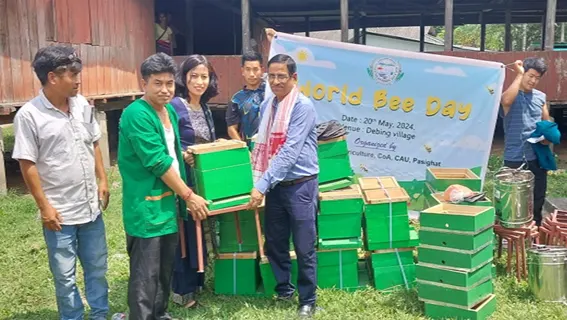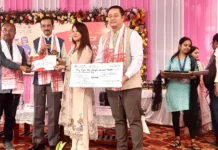NAHARLAGUN, 20 May: The agriculture directorate celebrated the World Bee Day at the Krishi Bhavan here on Monday, under this year’s theme, ‘Bee engaged with the youth’.
In the opening session, representatives of the notified districts under the Arunachal Bee & Honey Mission (ABHM) delivered presentations on the various works done and the achievements in the field of beekeeping in their respective districts.
Three districts – Papum Pare, Changlang, and Lohit – were conferred commendation certificates for being the best ABHM performing districts.
Later, a trainers’ training programme on beekeeping for field functionaries was conducted.
“This year’s theme underscored the importance of raising awareness on the role of the bees in pollination, and their contribution towards sustainable development in nutrition in the form of honey, and the threat they face,” the directorate informed in a release.
Beekeeping can also serve as a source of employment for the unemployed youths of the country in general and Arunachal Pradesh in particular, it said.
“There are mainly seven types of bees found in the state for pollination with economic importance: The rock bee, the Indian honeybee, the European honeybee, the dwarf honeybee, the bumblebee, and the stingless bee,” it said, adding that “the rich and diverse flora and fauna of Arunachal Pradesh is a sleeping giant in honey production.”
Among others, Horticulture Director Nawang Lobsang, Sericulture Assistant Director Opung Jamoh, Agriculture Director Tomi Basar, and ABHM MD TD Neckom attended the programme.
In East Siang district, Pasighat-based College of Agriculture (CoA) organised an ‘awareness-cum-critical input distribution’ programme at Debing village on Monday to celebrate the World Bee Day.
Addressing the 45 participating apiculturists, CoA Dean Dr AK Tripathi highlighted the importance of honeybee and entrepreneurship development on beekeeping for unemployed youths.
CoA Assistant Professor Dr Denisha Rajkhowadelivered a lecture on the importance of beekeeping, and explained how to increase crop production through honeybee pollination and utilisation of different beehive products.
Honeybee boxes, honey extractors, bee veils, bee gloves, and box stands were later distributed among the apiculturists, the college informed in a release.


